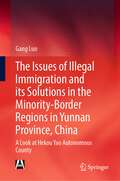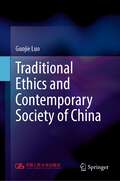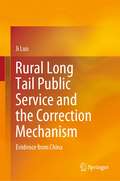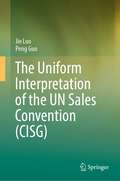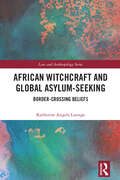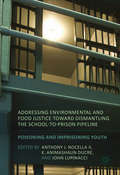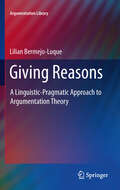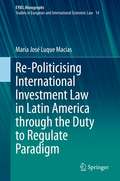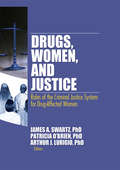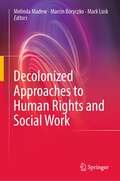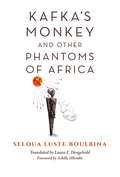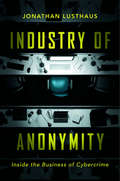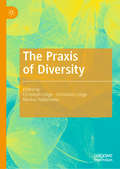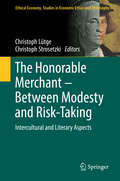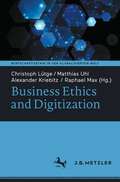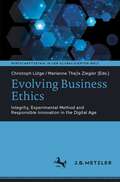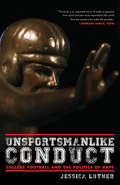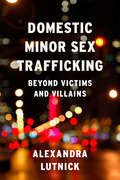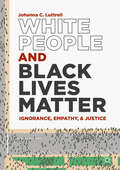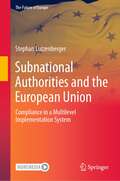- Table View
- List View
The Issues of Illegal Immigration and its Solutions in the Minority-Border Regions in Yunnan Province, China: A Look at Hekou Yao Autonomous County
by Gang LuoThis book analyzes the governance of illegal immigrants in ethnic areas along China’s southwest border. Since China is not an immigrant country and lacks an immigrant culture, the goals of law enforcement departments are limited to sanfeirenyuan (three types of illegal persons: illegal immigrants, illegal residents, and illegal employees). The transformation of sanfeirenyuan, an issue that has plagued China for many years, into an “illegal immigration” governance issue that is of general concern to the international community, has led to fundamental changes in research methods and research topics. The research presented here makes the issue China now faces part of global issues; by using the “worldview on China’s issues” to assess current problems, it can also show how “China’s solutions can be applied to global issues.” The unique feature of this book is that it approaches the issue of illegal immigration as an unconscious crisis. Accordingly, it holds substantial value in terms of exploring the theoretical basis of and governance methods for maintaining national security in the context of globalization, as well as the early warning mechanisms and crisis management in the context of China’s national security. Since China has a long southwest border, the stability and security of border ethnic areas have long played a decisive role in the stability and security of the country as a whole: if the frontiers are stable, the country enjoys enhanced security. Consequently, investigating the governance mechanism for illegal immigrants in the ethnic areas of the southwest border is of considerable practical relevance. This book offers a valuable asset for researchers in related fields and can be used as a reference book for students of national security. It also benefits practitioners in relevant management departments.
Traditional Ethics and Contemporary Society of China
by Guojie LuoBased on the ethical thinking of the pre-Qin Dynasty, this book discusses the formation and development of traditional Chinese ethics, the refinement of the Confucian ethical normative system and the establishment of its orthodoxy, as well as the deepening and maturation of feudal ethics. The book is simple in style and clear in context. It contains not only the essence of traditional Chinese morality but also the achievements of modern civilization. It analyzes the implications of traditional Chinese ethics on the governance and moral construction of modern society and can be used as a reference for governance and revitalization of the country and moral development.
Rural Long Tail Public Service and the Correction Mechanism: Evidence from China
by Ji LuoThis book firstly analyzes the status and characteristics of rural long tail public service and its unbalance in detail. In all, based on the long tail theory, mechanism design theory and resource dependence theory, this book makes an empirical study and basic judgment on the matching of supply and demand of rural long tail public services in China and explores the mechanism of the efficiency of supply and demand affecting the imbalance. This book presents a correction mechanism of rural long tail public demand based on the division of different response subjects and puts forward corresponding policy suggestions. By putting the rural public demand in the “embedded” economic and social system and the development process, this book analyzes its future trend and response path. Then, based on the difference of governance efficiency, this book analyzes the general causes of the unbalance of supply and demand of rural long tail public service. Especially for the representative field of rural public service (e.g., special education, old-age caring, medical care), this book carries out empirical studies (seemingly unrelated regression) to analyze the factors, internal mechanism and basic path of the imbalance of rural long tail public service. Thirdly, through the construction of the imbalance index of rural long tail public service, this book makes an empirical calculation of the severity of this imbalance. This book further puts forward the design of the correction mechanism for the imbalance of rural long tail public service and carries on the reasonable and orderly division for different supply subjects. In the end, this book puts forward the balanced “Internet + NGO” model for rural long tail public service and takes JD.com as an example to expound the operation of the network platform of the correction mechanism.
The Uniform Interpretation of the UN Sales Convention (CISG)
by Jie Luo Peng GuoThe unification of international commercial law has been a common course for every country of the world. The U.N. Convention on Contracts for International Sale of Goods (CISG) is a milestone in creating a uniform law in the field of the international sale of goods. The CISG coordinated divergent political, economic, and legal systems combined different contract laws and set up a comprehensive and independent legal framework for the international sale of goods. This book examines the basic requirements and criteria of the CISG’s interpretation and investigates how to achieve the uniform interpretation of the CISG based on interpretation rules in the CISG and through appropriate legal interpretation approaches. As a comprehensive and uniform legal framework for the international sale of goods, the CISG still has gaps to fill. Therefore, a uniform interpretation in gap-filling is equally important for the CISG. This book discusses gap-filling in the CISG, explains why and how to fill its gaps, clarifies gap-filling approaches, their order of application, and eventually concentrates on general principles and the uniform interpretation of the CISG. Another feature of the book is to discuss the supplementary materials that could be used to assist in the uniform interpretation of the CISG. PICC, foreign cases, UNCITRAL Digest, and the CISG Advisory Council opinions will be examined in detail to see whether and how they can fill the gaps in the CISG and promote its uniform interpretation. Only by clarifying the basic requirements and principles relating to the CISG’s uniform interpretation, can courts and arbitral tribunals correct their attitude toward and practices in the interpretation of the CISG. Only by following the autonomous interpretation approach, can the CISG achieve its goal to unify the sale of goods laws and promote the development of international commerce.
African Witchcraft and Global Asylum-Seeking: Border-Crossing Beliefs (Law and Anthropology)
by Katherine LuongoThis book analyzes how over the last two decades, immigration regimes in three primary refugee-receiving states in the Global North – Canada, Australia, and the United Kingdom – have engaged with allegations about witchcraft-driven violence made by asylum seekers coming from Anglophone countries across the African continent. The work intervenes at the nexus of anthropological, historical, legal, developmental, and human rights literatures to offer fresh insights into extrajudicial violence and global migration. Taking witchcraft-based asylum cases as its focal point, it argues that the recent dramatic expansion in claims to refugee protection under the ‘particular social group’ category of the 1951 UN Refugee Convention reflects immigration authorities’ increasing willingness to consider how legally recognizable persecution can derive from cultural practices and beliefs. Reflecting critically on such cases, it advances understandings of how witchcraft beliefs and practices have persisted as significant engines of violence in the contemporary world. It sheds light both on the limits of legal pluralism and cultural relativism in asylum adjudication and on how social scientific expertise contributes not simply to the flow of ideas, but also to the channelling of people across national, cultural, and epistemological boundaries. The book will be essential reading for students and researchers in legal anthropology, African studies, human rights, transnational history, migration and refugee law and policy, and the history and anthropology of witchcraft.
Addressing Environmental and Food Justice toward Dismantling the School-to-Prison Pipeline: Poisoning and Imprisoning Youth
by John Lupinacci Anthony J. Nocella K. Animashaun DucreThis cutting-edge collection of essays presents to the reader leading voices within food justice, environmental justice, and school to prison pipeline movements. While many schools, community organizers, professors, politicians, unions, teachers, parents, youth, social workers, and youth advocates are focusing on curriculum, discipline policies, policing practices, incarceration demographics, and diversity of staff, the authors of this book argue that even if all those issues are addressed, healthy food and living environment are fundamental to the emancipation of youth. This book is for anyone who wants to truly understand the school to prison pipeline as well as those interested in peace, social justice, environmentalism, racial justice, youth advocacy, transformative justice, food, veganism, and economic justice.
History of the Mafia
by Salvatore LupoWhen we think of the Italian Mafia, we think of Marlon Brando, Tony Soprano, and the Corleones-iconic actors and characters who give shady dealings a mythical pop presence. Yet these sensational depictions take us only so far. The true story of the Mafia reveals both an organization and mindset dedicated to the preservation of tradition. It is no accident that the rise of the Mafia coincided with the unification of Italy and the influx of immigrants into America. The Mafia means more than a horse head under the sheets-it functions as an alternative to the state, providing its own social and political justice.Combining a nuanced history with a unique counternarrative concerning stereotypes of the immigrant, Salvatore Lupo, a leading historian of modern Italy and a major authority on its criminal history, has written the definitive account of the Sicilian Mafia from 1860 to the present. Consulting rare archival sources, he traces the web of associations, both illicit and legitimate, that have defined Cosa Nostra during its various incarnations. He focuses on several crucial periods of transition: the Italian unification of 1860 to 1861, the murder of noted politician Notarbartolo, fascist repression of the Mafia, the Allied invasion of 1943, social conflicts after each world war, and the major murders and trials of the 1980s. Lupo identifies the internal cultural codes that define the Mafia and places these codes within the context of social groups and communities. He also challenges the belief that the Mafia has grown more ruthless in recent decades. Rather than representing a shift from "honorable" crime to immoral drug trafficking and violence, Lupo argues the terroristic activities of the modern Mafia signify a new desire for visibility and a distinct break from the state. Where these pursuits will take the family adds a fascinating coda to Lupo's work.
Cornes and Lupton's Design Liability in the Construction Industry
by Sarah LuptonLiability for the design of a building or structure is of fundamental concern to construction professionals, design-build contractors, specialist sub-contractors, and lawyers. Although other texts cover a wide range of aspects of liability, only Cornes and Lupton's Design Liability in Construction draws together all those matters that relate specifically to design.A number of factors have come together recently and are addressed in this significant update and rewrite of the 4th edition, including: popularity of design & build procurementpartnering arrangements and early contractor involvementnew standard forms of construction contract and appointment, and revisions to older formstechnical innovations in constructioncollaborative working and BIM systemsmany well-publicised cases regarding design failuressignificant developments in the law of tort and professional liabilitythe development of the single European market and increased provision of services overseasTogether these factors create a new range of design liability issues which the construction professional has to face. Written for lawyers, architects, engineers, and contractors, the fifth edition of Design Liability in Construction will also serve as a useful text for masters level courses in engineering, surveying and construction law.
Giving Reasons
by Lilian Bermejo LuqueThis book provides a new, linguistic approach to Argumentation Theory. Its main goal is to integrate the logical, dialectical and rhetorical dimensions of argumentation in a model providing a unitary treatment of its justificatory and persuasive powers. This model takes as its basis Speech Acts Theory in order to characterize argumentation as a second-order speech act complex. The result is a systematic and comprehensive theory of the interpretation, analysis and evaluation of arguments. This theory sheds light on the many faces of argumentative communication: verbal and non-verbal, monological and dialogical, literal and non-literal, ordinary and specialized. The book takes into consideration the major current comprehensive accounts of good argumentation (Perelman's New Rhetoric, Pragma-dialectics, the ARG model, the Epistemic Approach) and shows that these accounts have fundamental weaknesses rooted in their instrumentalist conception of argumentation as an activity oriented to a goal external to itself. Furthermore, the author addresses some challenging meta-theoretical questions such as the justification problem for Argumentation Theory models and the relationship between reasoning and arguing.
Re-Politicising International Investment Law in Latin America through the Duty to Regulate Paradigm (European Yearbook of International Economic Law #14)
by María José Luque MacíasThis book offers insights into how international investment law (IIL) has frustrated states’ protection of human rights in Latin America, and IIL has generally abstained from dealing with inter-regime frictions. In these circumstances, this study not only argues that IIL should be an object of contention and debate (‘politicisation’). It also contends that Latin American countries have traditionally been the frontrunners in the politicisation of international legal instruments protecting foreign investment, questioning whether the paradigms informing their claims’ articulation are adequate to frame this debate. It demonstrates that the so-called ‘right to regulate’ is the paradigm now prevalently used to challenge IIL, but that it is inadequate from a human rights perspective. Hence, the book calls for a re-politicisation of IIL in Latin America through a re-conceptualization of how states’ regulation of foreign investment is understood under international human rights law, which entails viewing it as an international duty. After determining what the ‘duty to regulate’ constitutes in relation to the right to water and indigenous peoples’ right to lands based on human rights doctrine, the book analyses the extent to which Latin American countries are currently re-politicising IIL through an articulation of this international duty, and arbitral tribunals’ responses to their argumentative strategies. Based on these findings, the book not only proposes investment treaties’ reform to anchor the ‘duty to regulate’ paradigm in IIL, and in the process, to induce tribunals’ engagement with human rights arguments when they come to underpin respondent states’ defences in investor-state dispute settlement (ISDS). In addition, drawing upon the (now likely defunct) idea of creating a regional ISDS tribunal, the book briefly reflects on options available to such a tribunal in terms of dealing with troubling normative/institutional interactions between regimes during ISDS proceedings.
Drugs, Women, and Justice: Roles of the Criminal Justice System for Drug-Affected Women
by Arthur J. Lurigio James A. Swartz Patricia O’BrienA unique interdisciplinary exploration of a pressing social issueThe numbers of women offenders involved in the correctional system are quickly growing. Drugs, Women, and Justice: Roles of the Criminal Justice System for Drug-Affected Women gathers a distinguished group of researchers and policy analysts into one volume to explore the broad social and individual implications of current policy and practice pertaining to women in the criminal justice system. This valuable resource provides readers with a superb overview of the current state of knowledge and provides recommendations for new directions. Each top-notch chapter was originally presented at the 2005 Drugs, Women, and Justice Symposium, held on the University of Illinois at Chicago campus and sponsored by the Jane Addams College of Social Work Substance Abuse Research Collaboration through a grant from the National Institute on Drug Abuse.Traditionally, criminal justice studies and rehabilitation programs have focused on male offenders. Recent studies reinforce the current evidence that females should have their needs addressed differently. This unique book presents the latest research and thinking in complex and still emerging areas of policy and treatment for women in the criminal justice system.Topics in Drugs, Women, and Justice: Roles of the Criminal Justice System for Drug-Affected Women include: characteristics of drug-involved women in the criminal justice system the negative impact on families of punitive drug laws and child welfare legislation assessing and managing the service needs of children whose mothers have been arrested influences of feelings of isolation on the course of rehabilitation demographic differences between women in drug treatment and drug-involved women in the criminal justice system service needs of women released from prison a program developed for women who have survived traumatic violence, working in the street economy, and the criminal justice system the direct and indirect impact of mass incarceration on women and more Drugs, Women, and Justice: Roles of the Criminal Justice System for Drug-Affected Women is essential reading for researchers, criminologists, sociologists, social workers, psychologists, clinicians, feminists, and policymakers in the areas of social welfare, criminal justice, and drug policy.
Marriageology: The Art and Science of Staying Together
by Belinda LuscombeThe fault lines that can fracture a marriage are all contained in these six words: FAMILIARITY, FIGHTING, FAMILY, FINANCES, FOOLING AROUND AND FINDING HELP. It&’s time to get to know your F words. Using the latest scientific research, personal anecdotes and expert advice, award-winning journalist Belinda Luscombe argues that marriage is good for your health, your finances and your happiness. But it isn&’t always easy! Focusing on what Belinda describes as her F words, she presents facts, debunks myths, and provides an entertaining mix of data, anecdotes and wisdom from a wide range of approaches to married life, drawing on the work of experts from within the marriage and divorce industries. A brilliant guide to staying together, Marriageology offers helpful advice and gives readers something to think about whether your marriage is on the brink of collapse or just needs a bit of maintenance.
Magistracy and the Historiography of the Roman Republic
by Ayelet Haimson LushkovThe study of Roman republican magistracy has traditionally been the preserve of historians posing constitutional and prosopographical questions. As a result, one fundamental aspect of our most detailed contemporary and near-contemporary sources about magistracy has remained largely neglected: their literariness. This book takes a new approach to the representation of magistrates and shows how the rhetorical and formal features of prose texts - principally Livy's history but also works by Cicero and Sallust - shape our understanding of magistracy. Applying to the texts an expanded concept of exemplarity, Haimson Lushkov shows how a rich body of anecdotes concerning the behaviour and speech of magistrates reflects on the values and tensions that defined the republic. A variety of contexts - familial, military, and electoral, among others - flesh out the experience of being, becoming, and encountering a Roman magistrate, and the political and ethical problems highlighted and negotiated in such circumstances.
Decolonized Approaches to Human Rights and Social Work
by Mark Lusk Melinda Madew Marcin BoryczkoDespite committed effort to integrate postcolonial theory and decolonizing practices in human rights education in social work, there is scant literature offering a more balanced global perspective. This book addresses that need. Included here are discursive voices contributed by social work colleagues whose work is impacted by postcolonial realities. The task of decolonizing social work as a human rights profession calls for the inclusion of contesting perspectives from social work activists, human rights advocates and educators whose critical standpoints are drawn from the historical context of Global North-South relations. This book is essential given the many manifestations of global injustice, wars and climate catastrophes. The critical involvement of social workers in decolonized human rights advocacy is at no period in history, more urgent than now. The book: Engages readers in reflective discourse over the contentious manner human rights principles are referenced by social work practitioners within the context of contemporary North-South geopolitics Explores dilemmas, conflicts, challenges and limitations experienced by social workers worldwide while upholding human rights principles Uses critical case studies that expose how the vestiges of colonialism continue to impact communities Identifies areas of human rights advocacy where social work succeeds, and where it is confronted by limiting challenges Emphasizes the importance of human rights education and practice in the context of global inequalities Decolonized Approaches to Human Rights and Social Work provides models of good practice the world over in human rights advocacy. It is timely and essential reading for faculty who teach courses in social work, social development, community organization, human rights and social justice, as well as for students in social work, law, sociology, global studies and human rights. The book should draw readers who work in non-governmental organizations, international development agencies, advocacy groups, and community-based and grassroots organizations. International research centers, law clinics and organizations serving migrants and refugees would find it a useful resource.
Kafka's Monkey and Other Phantoms of Africa (World Philosophies)
by Seloua Luste BoulbinaEven though many of France’s former colonies became independent over fifty years ago, the concept of "colony" and who was affected by colonialism remain problematic in French culture today. Seloua Luste Boulbina, an Algerian-French philosopher and political theorist, shows how the colony’s structures persist in the subjectivity, sexuality, and bodily experience of human beings who were once brought together through force. This text, which combines two works by Luste Boulbina, shows how France and its former colonies are haunted by power relations that are supposedly old history, but whose effects on knowledge, imagination, emotional habits, and public controversies have persisted vividly into the present. Luste Boulbina draws on the work of Michel Foucault, Frantz Fanon, and Édouard Glissant to build a challenging, original, and intercultural philosophy that responds to blind spots of inherited political and social culture. Kafka's Monkey and Other Phantoms of Africa offers unique insights into how issues of migration, religious and ethnic identity, and postcolonial history affect contemporary France and beyond.
Industry of Anonymity: Inside the Business of Cybercrime
by Jonathan LusthausJonathan Lusthaus lifts the veil on cybercriminals in the most extensive account yet of the lives they lead and the vast international industry they have created. Having traveled to hotspots around the world to meet with hundreds of law enforcement agents, security gurus, hackers, and criminals, he charts how this industry based on anonymity works.
The Praxis of Diversity
by Christoph Lütge Christiane Lütge Markus FaltermeierThis edited collection brings together experts from various disciplines to engage critically with diversity theory, diversity politics, and their practical application. Accordingly, the volume provides a provocative discursive space, where the key theoretical as well as practical problems of diversity in business, institutions and culture can speak to each other and can be assessed. The aim is to bridge the gap between two relatively distinct discourses: the discourse on practical applications of diversity concepts and the discourse on theoretical approaches to diversity. This selection of articles delivers the first step towards achieving this goal. Approaching diversity from a business perspective, the chapters discuss its ramifications on democratic institutions and theory, as well as point to its relevance in didactic and educational settings.
The Honorable Merchant – Between Modesty and Risk-Taking: Intercultural and Literary Aspects (Ethical Economy #56)
by Christoph Lütge Christoph StrosetzkiThis volume explores the concept of the honest merchant, taking a broad perspective and covering a wide range of aspects. It looks at the different types of “honest merchant” conceptions originating from different cultures and literary traditions. The book covers Japanese, Islamic, Scandinavian, Russian, German, Spanish, as well as other aspects, and studies different disciplinary backgrounds of the honest merchant, such as philosophical, economic, neuroethical, sociological and literary ones.The concept of the honest merchant has a long tradition in business ethics. In the Hanseatic League and in medieval Italy, the ideal of the honest businessman was taught since the late Middle Ages. It originated during a time when travelling merchants were often regarded with a sceptical eye. The honest merchants of their time however held clear principles in their business and took responsibility for their community. In later times, the religious notions of the concept lost their pivotal place to reason and morality. This book goes beyond the tradition of discussing business ethics in association with concepts from the Hanseatic League and medieval Italy, and puts the central concept of business ethics in a much greater perspective.
Business Ethics and Digitization (Wirtschaftsethik in der globalisierten Welt)
by Christoph Lütge Matthias Uhl Alexander Kriebitz Raphael MaxIn this collection, we bring together various disciplines that are critically engaged in reflecting the diverse aspects of digitization in business, politics, ethics, and education. Accordingly, the volume will provide a provocative discourse space, were the key theoretical and practical problems of implementing ethics in digitization will be discussed and assessed. Moreover, we aim to create a bridge between two (hitherto) mostly separate discourses: the ethical discourse of issues of digitization and the discourse on ethical standards and their implementation in the area of business. These discourses are greatly in need of being joined together, since the vast majority of ethical standards in the field of digitization will have to be implemented by companies, not government agencies, NGOs or other non-profit organisations. We believe that this particular selection of articles is a first step towards creating this bridge.
Evolving Business Ethics: Integrity, Experimental Method and Responsible Innovation in the Digital Age (Wirtschaftsethik in der globalisierten Welt)
by Christoph Lütge Marianne Thejls ZieglerBusiness ethics as a discipline has been evolving rapidly, and indeed needs to evolve constantly. This evolution is mandated more urgently than ever before as we plunge headlong, and with increasing velocity, into the era of automation, artificial intelligence and digitization. In a scenario where legal and policy guidelines are scarce or ambiguous, the role of business ethics in guiding academic and industrial research and innovation cannot be understated. Ethical codes and guidelines are needed for educators, scientists, industries, law and policy makers, as well as for the general public engaged with emerging technologies not only to ensure a smooth transition into the autonomous and digital age, but also to ensure that in the process, we do not unknowingly disengage from basic human rights, values and responsibilities. Traditional, time tested and universally accepted principles of (business) ethics, including principles of integrity, responsibility and sustainability must, therefore, not be abandoned, but rather permitted to evolve to address the unique issues that emerging technologies present to humankind. This evolution necessarily entails an evolution also in research methods (including methods that permit multi-disciplinary and multi-stakeholder engagement), entrepreneurship ethics and a multi-cultural understanding of human rights and responsibilities, as relevant to emerging technologies such as autonomous driving. The envisaged volume “Evolving Business Ethics: Integrity, Sustainability and Responsible Innovation in the Digital Age” accordingly brings together contributions in the field of business ethics from a diversity of perspectives and disciplines.
Unsportsmanlike Conduct: College Football and the Politics of Rape
by Jessica Luther"Jessica Luther studied history and the classics before marshaling her writing talent toward of-the-moment topics like sexual assault and college sports culture. Now she's an investigative journalist, working from her adopted hometown, Austin, Tex., in what is perhaps the nation's most college-obsessed state. Ms. Luther's new book, Unsportsmanlike Conduct, examines the 'programmatic manner' in which sexual assaults are swept under the rug by institutions both on campus and in the media."--New York Times"Not to reckon with Luther's book would be an abdication not only of one's moral faculty but also of one's fandom...Luther does't just want to save future victims; she wants to save college football."--New York Times Book Review"A significant and riveting look at how one of the greatest cultural tragedies of the millennial generation--the silencing of sexual violence against women on campus--is nurtured by a system of cover-ups and corporatized crises management."--Playboy.com"In Unsportsmanlike Conduct, [Luther] draws on years of research and reporting to outline what she calls the 'playbook'--all the standard, predictable ways that football programs, universities, the NCAA, and sports media typically respond when athletes are accused of rape or assault. It's an infuriating, exhaustively researched catalogue of problems, from denial and toothless language to ignoring or discrediting the victim."--Elle.com"The most important sports book of the year."--Booklist, Starred Review"Jessica Luther is a Texas-based investigative reporter who broke the story of Sam Ukwuachu, a football player at Baylor University who was then on trial for sexual assault. Since then she's kept track of the dozens of sexual-assault claims made against college football players every year. Here, she looks at the relationship between football and sexual assault, the people and systems that perpetuate it, and how we can change the narrative going forward."--New York Magazine"Investigative journalist Luther catalogues the abuses created and enabled by college football programs and suggests workable reforms."-- Boston Globe, One of the Best Sports Books of 2016The latest from Akashic's Edge of Sports imprint.Football teams create playbooks, in which they draw up the plays they will use on the field. Playbooks are how teams work and why they win. This book is about a different kind of playbook: the one coaches, teams, universities, police, communities, the media, and fans seem to follow whenever a college football player is accused of sexual assault. It's a deep dive into how different institutions--the NCAA, athletic departments, universities, the media--run the same plays over and over again when these stories break. If everyone runs his play well, scrutiny dies down quickly, no institution ever has to change how it operates, and the evaporation of these cases into nothingness looks natural. In short, this playbook is why nothing ever changes.Unsportsmanlike Conduct unpacks this societal playbook piece by piece, and not only advocates that we destroy the old plays, but also suggests we replace them with ones that will force us to finally do something about this issue.Political sportswriter and Edge of Sports imprint curator Dave Zirin (the Nation) has never shied away from criticizing that which die-hard sports fans hold dear. The Edge of Sports titles will address issues across many different sports--football, basketball, swimming, tennis, etc.--and at both the professional and nonprofessional/collegiate levels. Furthermore, Zirin brings to the table select stories of athletes' journeys and what they are facing and how they evolve both in their sport as well as against the greater backdrop of one's life's odyssey.
The Rights of Women
by Namita Luthra Emily J. Martin Lenora M. LapidusThe Rights of Women is a comprehensive guide that explains in detail the rights of women under present U.S. law, and how these laws can be used in the continuing struggle to achieve full gender equality at home, in the workplace, at school, and in society at large. The Rights of Women explores the concept of equal protection and covers topics including employment, education, housing, and public accommodations. This handbook also examines the specific issues of trafficking, violence against women, welfare reform, and reproductive freedom.Using a straightforward question-and-answer format while translating the law into accessible language, this volume is a tool for individuals, lawyers, and advocates seeking to assert women's rights under the law.Now in its fully revised and updated fourth edition, The Rights of Women is an invaluable guide to finding legal solutions to the most pressing issues facing women today.
Domestic Minor Sex Trafficking: Beyond Victims and Villains
by Alexandra LutnickThe domestic sex trafficking of minors is a problem of growing concern yet little critical attention. This book analyzes the forces behind the sex-trafficking industry in the United States and provides a much-needed reference for practitioners. It adopts a holistic approach, pursuing a nuanced exploration of these young people's experiences, their treatment, and outside efforts to combat sex trafficking.The book features interviews with service providers and experts, and incorporates recent research, thereby mapping the complex factors associated with young people's involvement in trading sex and the social connections that facilitate their behavior. It considers the experiences of both those who "choose" sex work and those who are forced into it by circumstances or third parties, and it discusses the networks of friends and close acquaintances who introduce newcomers to the trade. In addition, it takes a hard look at how local and federal responses to trafficking increase young people's vulnerability to trading sex. Urging policymakers and practitioners to move beyond the simple framework of "rescuing" victims and "punishing" villains, this book calls for policies and programs that focus on the failure of social and cultural systems and respond better to the young people caught in this web.
White People and Black Lives Matter: Ignorance, Empathy, and Justice
by Johanna C. LuttrellThis book interrogates white responses to black-led movements for racial justice. It is a philosophical self-reflection on the ways in which ‘white’ reactions to Black Lives Matter stand in the way of the movement’s important work. It probes reactions which often prevent white people from according to black activists the full range of human emotion and expression, including joy, anger, mourning, and political action. Johanna C. Luttrell encourages different conceptions of empathy and impartiality specific to social movements for racial justice, and addresses objections to identity politics.
Subnational Authorities and the European Union: Compliance in a Multilevel Implementation System (The Future of Europe)
by Stephan LutzenbergerThe European Union, as a regulatory polity based on integration through law, arguably relies more on legal compliance with its policies than any other political system. Proceeding from this point of departure, this book puts the spotlight on the subnational tier and scrutinizes its role in ensuring compliance. Drawing on a dataset of infringement proceedings against federal and regionalized member states, the book shows that strong shared rule, i.e., strong cooperation between national and subnational authorities, can improve national compliance records. In contrast, policy sectors with strong redistributive consequences impair subnational authorities’ capacity to comply. In short, policy and politics matter more than polity.
